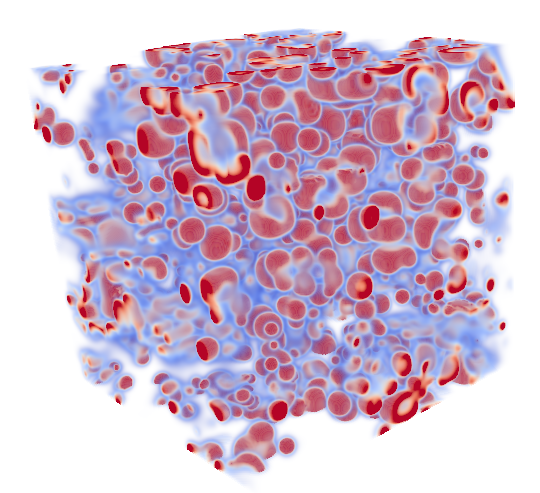auto it = Old.getDomainIteratorStencil(star_stencil_3D);
while (it.isNext())
{
auto Cp = it.getStencil<0>();
auto mx = it.getStencil<1>();
auto px = it.getStencil<2>();
auto my = it.getStencil<3>();
auto py = it.getStencil<4>();
auto mz = it.getStencil<5>();
auto pz = it.getStencil<6>();
New.get<U>(Cp) = Old.get<U>(Cp) + uFactor * (
Old.get<U>(mz) +
Old.get<U>(pz) +
Old.get<U>(my) +
Old.get<U>(py) +
Old.get<U>(mx) +
Old.get<U>(px) -
6.0*Old.get<U>(Cp)) +
- deltaT * Old.get<U>(Cp) * Old.get<V>(Cp) * Old.get<V>(Cp) +
- deltaT *
F * (Old.get<U>(Cp) - 1.0);
New.get<V>(Cp) = Old.get<V>(Cp) + vFactor * (
Old.get<V>(mz) +
Old.get<V>(pz) +
Old.get<V>(my) +
Old.get<V>(py) +
Old.get<V>(mx) +
Old.get<V>(px) -
6*Old.get<V>(Cp)) +
deltaT * Old.get<U>(Cp) * Old.get<V>(Cp) * Old.get<V>(Cp) +
- deltaT * (
F+K) * Old.get<V>(Cp);
++it;
}
[v_transform metafunction]
The rest of the example remain the same with the exception that the code has been extended in 3D.
#include "Grid/grid_dist_id.hpp"
#include "data_type/aggregate.hpp"
#include "timer.hpp"
constexpr int U = 0;
constexpr int V = 1;
constexpr int x = 0;
constexpr int y = 1;
constexpr int z = 2;
{
auto it = Old.getDomainIterator();
while (it.isNext())
{
auto key = it.get();
Old.template get<U>(key) = 1.0;
Old.template get<V>(key) = 0.0;
New.template get<U>(key) = 0.0;
New.template get<V>(key) = 0.0;
++it;
}
long int x_start = Old.size(0)*1.55f/domain.getHigh(0);
long int y_start = Old.size(1)*1.55f/domain.getHigh(1);
long int z_start = Old.size(1)*1.55f/domain.getHigh(2);
long int x_stop = Old.size(0)*1.85f/domain.getHigh(0);
long int y_stop = Old.size(1)*1.85f/domain.getHigh(1);
long int z_stop = Old.size(1)*1.85f/domain.getHigh(2);
auto it_init = Old.getSubDomainIterator(start,stop);
while (it_init.isNext())
{
auto key = it_init.
get();
Old.template get<U>(key) = 0.5 + (((double)std::rand())/RAND_MAX -0.5)/10.0;
Old.template get<V>(key) = 0.25 + (((double)std::rand())/RAND_MAX -0.5)/20.0;
++it_init;
}
}
int main(int argc, char* argv[])
{
openfpm_init(&argc,&argv);
size_t sz[3] = {128,128,128};
double deltaT = 1;
double du = 2*1e-5;
double dv = 1*1e-5;
size_t timeSteps = 5000;
double K = 0.053;
double spacing[3] = {Old.spacing(0),Old.spacing(1),Old.spacing(2)};
size_t count = 0;
Old.template ghost_get<U,V>();
double uFactor = deltaT * du/(spacing[x]*spacing[x]);
double vFactor = deltaT * dv/(spacing[x]*spacing[x]);
{0,0,-1},
{0,0,1},
{0,-1,0},
{0,1,0},
{-1,0,0},
{1,0,0}};
for (size_t i = 0; i < timeSteps; ++i)
{
if (i % 300 == 0)
{std::cout << "STEP: " << i << std::endl;}
auto it = Old.getDomainIteratorStencil(star_stencil_3D);
while (it.isNext())
{
auto Cp = it.getStencil<0>();
auto mx = it.getStencil<1>();
auto px = it.getStencil<2>();
auto my = it.getStencil<3>();
auto py = it.getStencil<4>();
auto mz = it.getStencil<5>();
auto pz = it.getStencil<6>();
New.
get<U>(Cp) = Old.get<U>(Cp) + uFactor * (
Old.get<U>(mz) +
Old.get<U>(pz) +
Old.get<U>(my) +
Old.get<U>(py) +
Old.get<U>(mx) +
Old.get<U>(px) -
6.0*Old.get<U>(Cp)) +
- deltaT * Old.get<U>(Cp) * Old.get<V>(Cp) * Old.get<V>(Cp) +
- deltaT *
F * (Old.get<U>(Cp) - 1.0);
New.get<V>(Cp) = Old.get<V>(Cp) + vFactor * (
Old.get<V>(mz) +
Old.get<V>(pz) +
Old.get<V>(my) +
Old.get<V>(py) +
Old.get<V>(mx) +
Old.get<V>(px) -
6*Old.get<V>(Cp)) +
deltaT * Old.get<U>(Cp) * Old.get<V>(Cp) * Old.get<V>(Cp) +
- deltaT * (
F+K) * Old.get<V>(Cp);
++it;
}
Old.copy(New);
Old.ghost_get<U,V>();
if (i % 500 == 0)
{
count++;
}
}
std::cout <<
"Total simulation: " << tot_sim.
getwct() << std::endl;
openfpm_finalize();
}
This class represent an N-dimensional box.
This is a distributed grid.
__device__ __host__ index_type get(index_type i) const
Get the i index.
Class for cpu time benchmarking.
void stop()
Stop the timer.
void start()
Start the timer.
double getwct()
Return the elapsed real time.
OutputIteratorT OffsetT ReductionOpT OuputT init
< [in] The initial value of the reduction
aggregate of properties, from a list of object if create a struct that follow the OPENFPM native stru...
